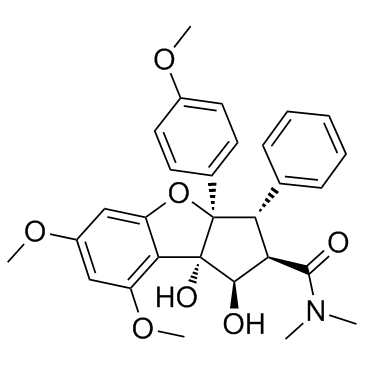Rocaglamide sensitizes leukemic T cells to activation-induced cell death by differential regulation of CD95L and c-FLIP expression.
J Y Zhu, M Giaisi, R Köhler, W W Müller, A Mühleisen, P Proksch, P H Krammer, M Li-Weber
文献索引:Cell Death Differ. 16(9) , 1289-99, (2009)
全文:HTML全文
摘要
Drugs with tumor selectivity may have an important benefit in chemotherapies. We have previously shown that Rocaglamide(s), derived from the medicinal plant Aglaia, kills various leukemic cells through the mitochondrial apoptosis pathway with only minor toxicities to normal lymphocytes. Here, we show further that Rocaglamide preferentially promotes activation-induced cell death in malignant T cells by differential regulation of c-FLIP and CD95L expression. Rocaglamide enhances and also prolongs activation-induced JNK activation in malignant T cells leading to downregulation of c-FLIP but upregulation of CD95L expression. We also show that malignant T cells express a significantly higher amount of Bid - the molecular linker that bridges the receptor-mediated to the mitochondria-mediated apoptosis pathway. Conversely, a substantially lower amount of c-FLIP in response to T-cell stimulation compared to normal T cells is observed. This difference may provide a therapeutic window for cancer treatment. The effect of Rocaglamide on sensitization of activation-induced cell death in malignant T cells was further demonstrated in vivo in a mouse model. Our study demonstrates that Rocaglamide may be a potential anticancer drug that simultaneously targets both c-FLIP and CD95L expressions in tumor cells. This study may also provide a new clue to design a more efficient chemotherapy by using a combination of stimuli that engage the receptor-mediated and the mitochondria-mediated death pathway.
相关化合物
| 结构式 | 名称/CAS号 | 分子式 | 全部文献 |
|---|---|---|---|
 |
楝酰胺
CAS:84573-16-0 |
C29H31NO7 |
|
Inhibitors of Translation Targeting Eukaryotic Translation I...
2012-01-01 [Meth. Enzymol. 511 , 437-61, (2012)] |
|
Cyclorocaglamide, the first bridged cyclopentatetrahydrobenz...
2003-01-01 [J. Nat. Prod. 66(1) , 80-5, (2003)] |
|
Insecticidal rocaglamide derivatives from Aglaia spectabilis...
2000-08-01 [Phytochemistry 54(8) , 731-6, (2000)] |
|
Rocaglamide and a XIAP inhibitor cooperatively sensitize TRA...
2012-08-15 [Int. J. Cancer 131(4) , 1003-8, (2012)] |
|
Ponapensin, a cyclopenta[bc]benzopyran with potent NF-kappaB...
2007-01-01 [Bioorg. Med. Chem. Lett. 17(1) , 109-12, (2007)] |